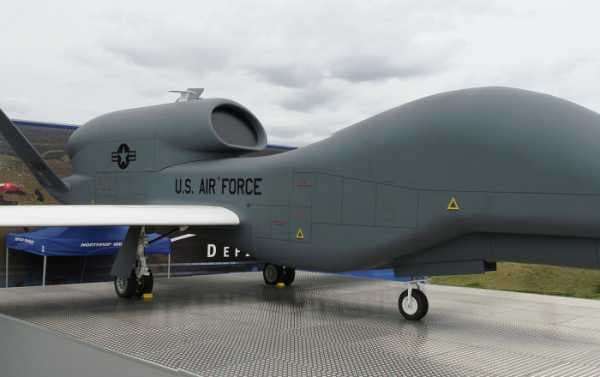
The US Air Force says that it must rely on artificial intelligence technology to sift through vast troves of data gathered from surveillance drones because, “if you are not first in developing artificial intelligence and the means to employ [it] … you’re going to be last.”
Airborne data collecting platforms like the RQ-4 Global Hawk have a problem: the usefulness of the data they collect is limited by how fast and how well it can be analyzed. US military intelligence gathers a lot of data, but in order to make the data useful for a decision making process, the Air Force needs a “sensing grid that fuses together data,” C4ISRNET reported Wednesday. AI will help the force interpret that fused data.
The AI will harvest information from airborne systems in development such as Gremlin drones, which the US military portrays as a swarm of small drones that take off from an aircraft mid-flight and are recovered by the same aircraft.
“How do I get the data so I can fuse it, look at it and then ask the right questions from the data to reveal what trends are out there?” Lt. Gen. VeraLinn Jamieson said in a July 31 interview with the news outlet.
“We have to do all of that at the speed of relevance,” she said.
The Air Force plans roll out complex AI architecture over the coming decade to solve that problem, Jamieson revealed, but most of the “flight plan” describing how the service branch will do this is classified, C4ISRNET noted. “I don’t want to give them anything that’s going to tip off what we’re doing,” she said, referring to Russia and China, but “the Chinese especially.”
“If you are not first in developing artificial intelligence and the means to employ — with structured data, with the infrastructure to support that, with a multi-cloud approach — you’re going to be last, because catch-up in this arena with disruptive technologies, it’s too hard, and it’s too fast,” the officer said.
A 2011 report by the US Defense Science Board states that while the Pentagon’s demand for information is “insatiable” and many technologies emphasize collection of data, there is actually so much data it’s not always useful.
“The deluge of sensor data is creating a crisis in processing, exploitation, and dissemination (PED) and associated communication,” DSB noted. “The insatiable demand for information and emphasis on collection is producing a deluge of data, overwhelming the ability to provide useful, actionable intelligence in a timely manner.”
Sourse: sputniknews.com






